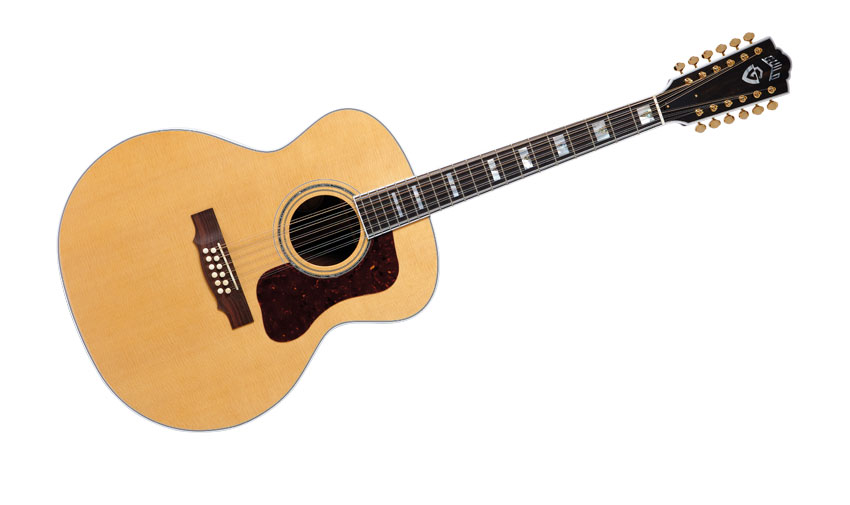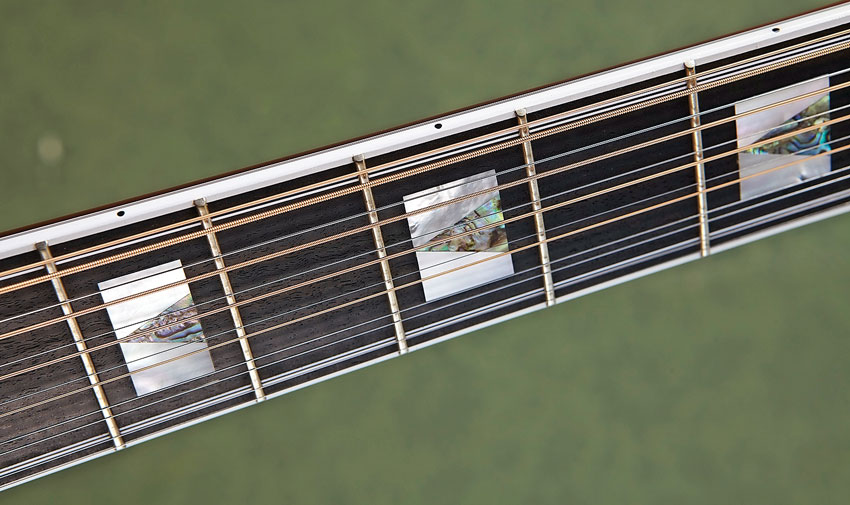MusicRadar Verdict
The dream 12-string: either the realisation of a dream, or a serious pro-grade working guitar (as long as you buy the one with a pickup!).
Pros
- +
Build quality is second to none, as are the tones.
Cons
- -
Not much.
MusicRadar's got your back

Guild Traditional F-512

Neck
The classic US acoustic firm has been slowly producing an increasing number and variation of instruments since relocating to its New Hartford, Connecticut production facility in 2009. We take a look at one the brand's greatest extravagances - the Traditional F-512 12-string.
Build
"The F-512 12-string Jumbo hails from the premium Traditional Series and is for all intents and purposes is a 'classic' Guild model"
The F-512 12-string Jumbo hails from the premium Traditional Series and is for all intents and purposes is a 'classic' Guild model.
Being a Jumbo, the F-512 is obviously one of the biggest of instruments the firm produces - an inch and a half wider than the recently reviewed D-55 dreadnought, albeit marginally less deep from front to back, and aping a curvier, F body type with the more pinched waist. This extra roominess - all things being equal - deepens bass, which tends to knock the mids back a touch in what you perceive, sonically.
A 12-string isn't usually a first choice for fingerpicking for obvious reasons, so you're more likely to hear them strummed or picking out plectrum melodies and chord arpeggios: it's a familiar sound that's distinctive, evocative and unmistakable.
Alongside the solid rosewood back and sides there's a solid Sitka spruce top supported by scalloped red (Adirondack) spruce bracing. Red spruce is lighter and stiffer than the Sitka variety, so makes a lot of sense for bracing a top that needs to be light, strong and resonant.
Some people like red spruce for the entire soundboard too, especially those with a hard pick attack, or players requiring maximum headroom and clarity. It can take a little bit of work to get the most from such a top, however, which is perhaps one reason that Guild has opted for the (usually) slightly more forgiving Sitka on this guitar.
Compared to the lower-priced Standard Series, Traditional instruments have more ornate binding, ebony headplates, more abalone and mother-of-pearl inlays and gold hardware. Their more 'upmarket' billing also brings ebony fingerboards and bridges.
Want all the hottest music and gear news, reviews, deals, features and more, direct to your inbox? Sign up here.
We must just mention the high-quality faux-alligator skin case that comes with a Traditional Series guitar, too. It might sound cheesy when you describe it, but boy does it make you feel great walking into a gig: super-classy and very cool indeed.
Sounds
Compared to a regular acoustic, the F-512 is obviously a whole different boiling pan of poisson. You need to spend some time getting over the novelty of having a 12-string if you don't play one regularly because, frankly, even the cheaper specimens sound pretty cool and different when they're first strummed.
"It's a genuine pleasure to hear, see and feel Guild at the top of its game"
This, however... oh lordy. You just revel in the sheer depth of the bass and the impressive punch with which notes and chords throw forwards. It's such a sonorous instrument, one of those guitars that even gets non-guitar-players excited by the noise it's making: very close to genuine magic. Go on, just try not playing Pink Floyd's Wish You Were Here for literally hours on end - an indulgence for sure.
It's a genuine pleasure to hear, see and feel Guild at the top of its game. If this guitar is anything to go by, the latest Traditional models are absolutely up there with the other big American names, offering superb quality craftsmanship and world-class tone. Any criticisms we could level are purely subjective in terms of aesthetic or personal tonal biases: and besides, we're genuinely struggling to think of any.
Handmade in the USA, it's certainly not an impulse purchase; to whit, we'd say that the F-512 is either a totally frivolous, got-to-have-the-best choice for the guitar player who has everything or, conversely, the realisation of the 12-string dream for anyone deadly serious about playing them professionally. Either way, it's melted every heart here. Hooray for New Hartford.